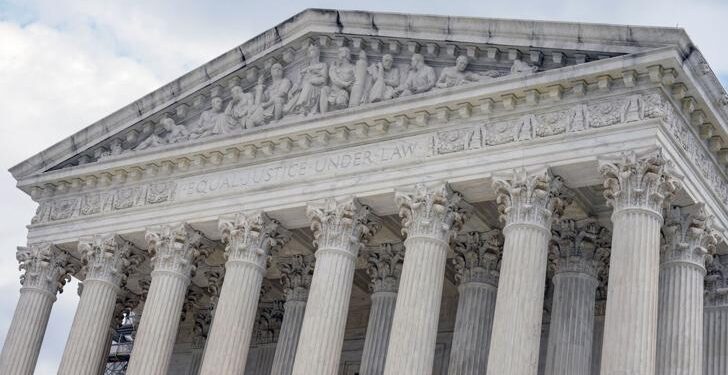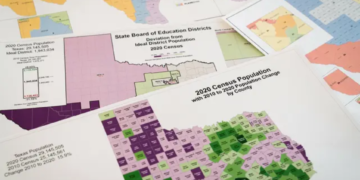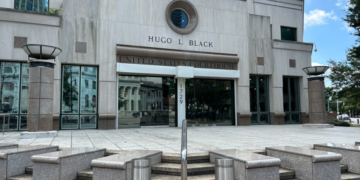Img source: deal.town
May 27, 2024 Story by: Publisher
WASHINGTON (AP) — The Supreme Court’s conservative majority upheld a Republican-held South Carolina congressional district on Thursday, overturning a lower-court decision that claimed the district discriminated against Black voters.
In a dissenting opinion, liberal justices expressed concern that the court’s decision shields states from accusations of unconstitutional racial gerrymandering.
The court’s 6-3 ruling stated that South Carolina’s Republican-controlled legislature acted lawfully during redistricting when it solidified Rep. Nancy Mace’s position by moving 30,000 Democratic-leaning Black residents of Charleston out of her coastal district.
“I’m very disturbed about the outcome. It’s as if we don’t matter. But we do matter and our voices deserve to be heard,” commented Taiwan Scott, a Black voter who challenged the redistricting.
President Joe Biden, whose administration supported Scott and the other plaintiffs, criticized the ruling, stating, “The Supreme Court’s decision today undermines the basic principle that voting practices should not discriminate on account of race and that is wrong.” Source: The American Presidency Project
Conversely, Mace responded to the ruling by saying, “It reaffirms everything everyone in South Carolina already knows, which is that the line wasn’t based on race.”
The case involved the complex task of distinguishing race from politics. The state contended that the redistricting was driven by partisan politics and population growth in coastal areas, not racial motives. The Supreme Court has previously allowed voter moves based on political affiliations.
A lower court had initially ordered South Carolina to redraw the district, finding that the state used race as a proxy for partisan affiliation, violating the 14th Amendment’s equal protection clause.
Thursday’s decision will not directly impact the 2024 election. The lower court had already mandated the state to use the disputed map in the November vote, potentially aiding Republicans in maintaining their slim House majority.
Justice Samuel Alito, writing for the court, criticized the lower court for its “misguided approach,” which he said failed to assume lawmakers acted in good faith and overly credited the challengers.
Alito pointed out a significant weakness in the Black voters’ case: they did not present an alternative map, which he interpreted as an “implicit concession” that they couldn’t have drawn one. “The District Court’s conclusions are clearly erroneous because it did not follow this basic logic,” he wrote.
In a dissenting opinion, Justice Elena Kagan, representing the three liberal justices, argued that her conservative colleagues overlooked the lower court’s findings of racial gerrymandering.
“Perhaps most dispiriting,” Kagan wrote, the court has adopted “special rules to specially disadvantage suits to remedy race-based redistricting.” Source: PBS
Richard Hasen, an election law expert at UCLA, agreed with Kagan, stating in a blog post that the decision “makes it easier for Republican states to engage in redistricting to help white Republicans maximize their political power.”
Janai Nelson, president and director-counsel of the NAACP Legal Defense and Educational Fund, criticized the ruling, saying, “The highest court in our land greenlit racial discrimination in South Carolina’s redistricting process, denied Black voters the right to be free from the race-based sorting and sent a message that facts, process, and precedent will not protect the Black vote.”
However, South Carolina Senate President Thomas Alexander praised the decision, asserting, “Our plan was meticulously crafted to comply with statutory and constitutional requirements, and I was completely confident we would prevail.”
The Supreme Court had ruled in 2019 that partisan gerrymandering cases could not be brought to federal courts. Justice Clarence Thomas, who supported that decision, wrote separately on Thursday, advocating for federal courts to similarly abstain from racial gerrymandering disputes. “It is well past time for the Court to return these political issues where they belong—the political branches,” Thomas wrote. No other justice joined his opinion.
Mace initially won her seat in 2020 by narrowly defeating Democratic incumbent Rep. Joe Cunningham by less than 5,400 votes. After redistricting based on the 2020 census, she secured reelection in 2022 by a 14 percent margin. Mace is one of eight Republicans who voted to remove Kevin McCarthy, R-Calif., as House speaker in October.
This case differs from an Alabama case where the court ruled that Republican lawmakers diluted Black voters’ political power under the Voting Rights Act by creating only one majority-Black district. That decision led to new maps in Alabama and Louisiana with additional districts where Democratic-leaning Black voters have substantial influence.
In South Carolina, a redrawn district would not have had a majority of Black voters. However, combined with a significant number of Democratic-leaning white voters, it could have made the district more competitive for Democrats.
The Supreme Court left unresolved a portion of the case regarding whether the map intentionally aimed to dilute Black residents’ votes.will be historic as the first jury verdict on criminal charges against a former U.S. president.
Trump is also facing over 50 charges in three other indictments, including two related to election interference and one concerning classified documents taken from the White House. Trial dates for these cases have not yet been scheduled.
Recently, Trump delivered a problematic speech at the Libertarian National Convention, where he faced boos from the audience. He urged libertarian voters to support his candidacy, warning them against continuing to achieve only “3% every four years.” Source: Huff Post

















